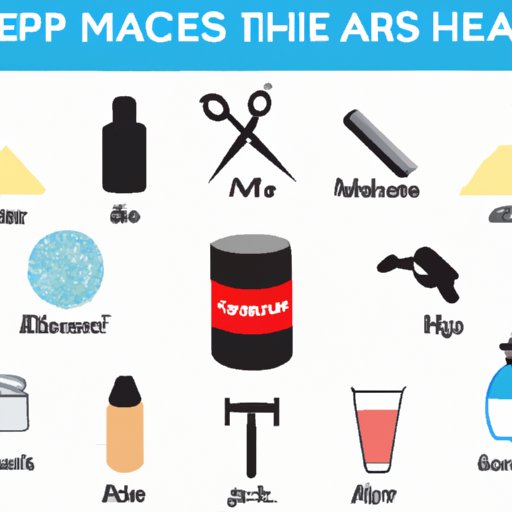Introduction
Itching after shaving can be an annoying and uncomfortable experience. Fortunately, there are several steps that can be taken to help prevent it. In this article, we will discuss the different tips and benefits of using an aftershave balm, a sharp razor, taking a warm shower before shaving, exfoliating the skin prior to shaving, applying pre-shave oil, rinsing the area with cold water after shaving, and avoiding using too much pressure when shaving.
Use an Aftershave Balm or Moisturizer to Soothe Irritation
Using an aftershave balm or moisturizer can help soothe irritation caused by shaving. An aftershave balm can help protect skin from infection and reduce inflammation. It can also help to reduce redness and soothe skin. When selecting an aftershave balm, look for one that is alcohol-free and contains natural ingredients such as aloe vera and chamomile.
To apply aftershave balm, simply wash your face with warm water and then pat dry. Apply the balm to areas that have been shaved. Massage the balm in a circular motion until it is fully absorbed. Allow the balm to remain on your skin for at least five minutes before rinsing off with cold water.

Use a Sharp Razor and Shave in the Direction of Hair Growth
It is important to use a sharp razor when shaving to help reduce irritation. A dull razor can cause more friction on the skin which can lead to irritation. It is also important to shave in the direction of hair growth. This helps reduce the amount of tugging and pulling on the skin which can also contribute to irritation.
Shaving in the direction of hair growth can also help reduce the chances of nicks, cuts, and ingrown hairs. Additionally, shaving in the direction of hair growth helps ensure that all of the hairs are cut, resulting in a smoother shave.

Take a Warm Shower Before Shaving to Soften Hairs
Taking a warm shower before shaving can help soften hairs and make them easier to cut. This can help reduce the amount of tugging and pulling on the skin which can lead to irritation. Additionally, a warm shower can open up pores which can help remove dirt and debris from the skin.
When taking a warm shower before shaving, use a mild cleanser to help cleanse the skin. Avoid using products that contain harsh chemicals or fragrances as these may irritate the skin. Additionally, avoid scrubbing the skin as this can also cause irritation. Once finished, gently pat the skin dry with a clean towel.
Exfoliate the Skin Prior to Shaving
Exfoliating the skin prior to shaving can help remove dead skin cells and debris from the skin. This can help reduce the chances of nicks and cuts while also helping to ensure a smoother shave. Additionally, exfoliating the skin can help reduce the appearance of ingrown hairs.
When exfoliating the skin prior to shaving, use a gentle exfoliator. Avoid using products that contain harsh chemicals or abrasive particles as these can irritate the skin. Gently massage the exfoliator into the skin in a circular motion and then rinse off with lukewarm water. Pat the skin dry with a clean towel.
Apply Pre-Shave Oil to Protect the Skin from Irritation
Applying pre-shave oil can help protect the skin from irritation caused by shaving. Pre-shave oil can help create a protective barrier between the razor and the skin which can help reduce the chances of nicks, cuts, and irritation. Additionally, pre-shave oil can help soften hairs which can make them easier to cut.
To apply pre-shave oil, simply pour a few drops onto your fingertips and massage it into the area that you intend to shave. Allow the oil to remain on your skin for at least five minutes before shaving. This will give the oil time to penetrate the skin and provide a protective barrier.
Rinse the Area with Cold Water After Shaving
Rinsing the area with cold water after shaving can help reduce inflammation and irritation. Cold water helps close pores and soothe the skin. Additionally, cold water helps reduce the chances of infection.
When rinsing the area with cold water, use a gentle cleanser to help remove any remaining debris. Avoid using products that contain harsh chemicals or fragrances as these may irritate the skin. Additionally, avoid scrubbing the skin as this can also cause irritation. Once finished, gently pat the skin dry with a clean towel.

Avoid Using Too Much Pressure When Shaving
It is important to avoid using too much pressure when shaving. Applying too much pressure can cause friction on the skin which can lead to irritation. Additionally, using too much pressure can result in nicks and cuts.
When shaving, use light strokes and go over the same area multiple times if necessary. This will help ensure that all of the hairs are cut without causing undue irritation. Additionally, avoid pressing the razor too hard against the skin as this can also cause irritation.
Conclusion
Itching after shaving can be an annoying and uncomfortable experience. However, there are several steps that can be taken to help prevent it. These include using an aftershave balm or moisturizer to soothe irritation, using a sharp razor and shaving in the direction of hair growth, taking a warm shower before shaving, exfoliating the skin prior to shaving, applying pre-shave oil to protect the skin from irritation, rinsing the area with cold water after shaving, and avoiding using too much pressure when shaving. By following these tips, you can help reduce the chances of experiencing itching after shaving.


